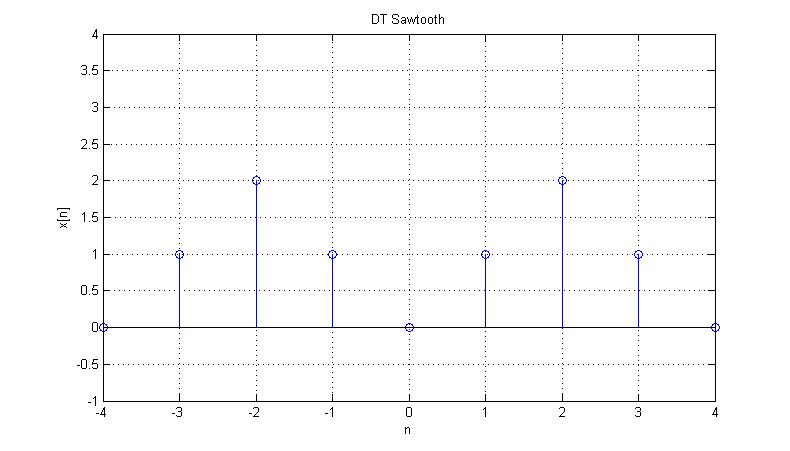| Line 19: | Line 19: | ||
<math>H(z) = e^{-j \omega m}</math> for n = 0 | <math>H(z) = e^{-j \omega m}</math> for n = 0 | ||
| − | + | <math>= 2 e^{-j \omega m}</math> for n = 1 | |
</font> | </font> | ||
| − | <font size=" | + | <font size="4"> |
<math>= 0</math> otherwise | <math>= 0</math> otherwise | ||
</font> | </font> | ||
Revision as of 21:57, 23 September 2008
Contents
[hide]DT LTI System
$ y[n] = x[n] + 2x[n-1] $
h[n]
$ h[n] = \delta [n] + 2 \delta [n-1] $
H(z)
$ H(z) = \sum_{m=-\infty}^{\infty}h[m] e^{-j \omega m} = \sum_{m=-\infty}^{\infty} (\delta [n] + 2 \delta [n-1]) e^{-j \omega m} = \sum_{m=-\infty}^{\infty} \delta [n] e^{-j \omega m} + \sum_{m=-\infty}^{\infty} 2 \delta [n-1] e^{-j \omega m} = \delta [n] e^{-j \omega m} + 2 \delta [n-1] e^{-j \omega m} $
In other words:
$ H(z) = e^{-j \omega m} $ for n = 0
$ = 2 e^{-j \omega m} $ for n = 1
$ = 0 $ otherwise
Response to x[n]
Input $ x[n] $ is the following signal:
The Fourier series coefficients for $ x[n] $ are:
$ a_{0} = 1 $
$ a_{1} = -\frac{1}{2} $
$ a_{2} = 0 $
$ a_{3} = -\frac{1}{2} $
$ y[n] = \sum a_{k} F(e^{jk \omega_{o}}) e^{jk \omega_{o}n} = \sum_{k=0}^{3} a_{k} F(e^{jk \frac{\pi}{2}}) e^{jk \frac{\pi}{2}n} = \sum_{k=0}^{3} a_{k} \frac{1}{1-\frac{1}{2 e^{jk \frac{\pi}{2}}}} e^{jk \frac{\pi}{2}n} = $


